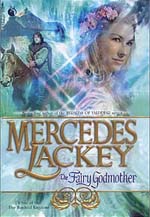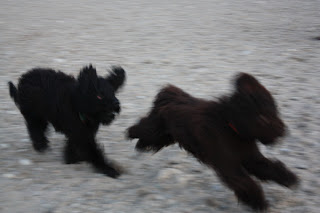It's the age old question of what is appropriate to recommend, what is appropriate to recommend for different groups... it's a hard line to figure out. Book series I read when I was in the 13-19 year old stage were pretty varied, and ranged from Tamora Pierce to Tanya Huff to Anne Bishop (who even though I read it, I would hesitate to recommend to someone who was as old as I was when I read it). I was lucky when I was a teen - my mom was a voracious reader, and she encouraged me to read anything and everything. I read Rohinton Mistry, Michael Ondaatje, most of the classics and pretty much anything I could get my hands on. The thing is, when I was working with youth for Now Hear This)) I noticed that a surprising amount of parents were pretty conservative when it came to what they thought their kids should, and could be reading. Books my not only my mom, but my fairly conservative private school had no issue encouraging us to read were books that the schools and parents I was working with found "questionable." We dealt with it on a case by case basis, one of my main objectives was to discuss with the parents and schools why they found the books "questionable" and explained to them why I thought they weren't. Since I never actually stopped reading YA fiction, both for work and pleasure, I felt (and feel) pretty confident in suggesting the following series to most teens, and most parents of teens!
 Mercedes Lackey's 500 Kingdoms is one of those series. I grabbed it off the adult fantasy shelf at Chapters, and it wasn't until my roommate and I were joking we should write or edit Harlequin Romance novels to pay our way through grad school that I realized not only is this series technically a Harlequin Romance novel, but the first book off their Luna young adult label. It never occurred to me (or my roommate) that this was the case. In related news, this is a fabulous series and you should go read it. I have lent it to everyone ranging from a 17 year old girl to a 32 year old guy, and not only did neither of them realize it was a romance novel, but they both loved it so much they went out and bought their own copies of the entire series.
Mercedes Lackey's 500 Kingdoms is one of those series. I grabbed it off the adult fantasy shelf at Chapters, and it wasn't until my roommate and I were joking we should write or edit Harlequin Romance novels to pay our way through grad school that I realized not only is this series technically a Harlequin Romance novel, but the first book off their Luna young adult label. It never occurred to me (or my roommate) that this was the case. In related news, this is a fabulous series and you should go read it. I have lent it to everyone ranging from a 17 year old girl to a 32 year old guy, and not only did neither of them realize it was a romance novel, but they both loved it so much they went out and bought their own copies of the entire series.
A friend of mine in real life introduced me to a friend of hers from Twitter who I met randomly at a TFC game then ran into at the Chapters she managed recommended the next series to me (yup. That's important.). I was hemming and hawing in the Fantasy section (over if I was going to read Patricia Briggs, something I've already discussed my being ridiculous about) and flipped out when she found out I hadn't read the Study series by Maria V. Snyder. In fairness, she was 100% right. It's a fabulously written YA series (that oh, hey, also in the adult fantasy section of Chapters). It's a series I can get behind recommending to anyone - it's historical(ish) with a little bit of... almost steampunk-ishbutnotreally with a kind of sci-fi-ish element. Tough to explain, but very much worth the read. Very very much.
This being said, I really do think there are a ton of books that are really YA friendly - and I'm not talking the (obvious) Tamora Pierce and Patricia C. Wrede books. Bedknobs and Broomsticks is a fabulous book, so is the entire OZ series (it's quite long, and quite wonderful). Percy Jackson I personally love, but then, it's Greek mythology, so no-brainer. Harry Potter is the old stand-by (do I date myself when I say that one of the worst work experiences I had was when I was working at an Arts Camp, I remember Harry Potter coming out and we had to stop the kids from reading so they could do crafts and play sports. It was awful, and we all felt terrible). Last (but nowhere least) the Bartimaeus trilogy is also fantastic. I tend to lean towards series when I'm recommending YA books - I find most of the readers like building a... friendship? with the characters. By readers, to be clear, I'm including myself!

































